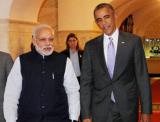New Delhi, Nov 21: In a major sign of deepening India-US ties, US President Barack Obama accepted Prime Minister Narendra Modi's invitation to be the chief guest at the Jan 26, 2015 Republic Day parade.
 At the invitation of Prime Minister Modi, the President will travel to India in January 2015 to participate in the Indian Republic Day celebration in New Delhi as the Chief Guest, said the White House in a statement.
At the invitation of Prime Minister Modi, the President will travel to India in January 2015 to participate in the Indian Republic Day celebration in New Delhi as the Chief Guest, said the White House in a statement.
The President will meet with the Prime Minister and Indian officials to strengthen and expand the US-India strategic partnership, it added.
"This Republic Day, we hope to have a friend over...invited President Obama to be the 1st US President to grace the occasion as Chief Guest," Modi tweeted.
The invitation to Obama comes weeks after Modi's hugely successful visit to the US. Modi and Obama also met on the sidelines of G20 summit in Brisbane on Nov 14. Obama had called Modi a "man of action."
This will be Obama's second visit to India. He had visited India in 2010 at the invitation of then prime minister Manmohan Singh and had addressed a joint session of parliament.





Comments
Wow, wonderful blog structure! How long have you ever been running a blog for?
you make blogging glance easy. The entire glance of your site
is wonderful, let alone the content!
Also visit my web site: helpdesk support: http://aress.support/helpdesk-support.html
Add new comment